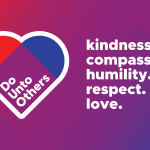The Greatest of These is Love
Today, we wrap up our summer series on Faith, Hope, and Love. We have explored faith that is ?energy itself?fluid, always in motion but never constant?yet, always there, surging and ebbing, sometimes strongly evident and at other times barely discernable on our spiritual landscape. Faith is fragile, and something that needs tending.? Faith is a complete and total trust in God, it is faith like a mustard seed, where it can be so small it can feel insignificant, but even a small faith is great for God-because God can grow that faith into something amazing. It is trusting in God throughout everything in your life. Through the storms and journeys that are a part of life. Faith in God carries us through life. Then we moved from faith into exploring hope. Hopeis defined as expecting with confidence or trust. It is also the feeling of wanting something to happen and thinking that it could happen, a feeling that something good will happen or be true. One of the things we talked through was looking at where we place our hope and who is it that we obey. From Hebrews 11:1-2 we heard these words-??Now faith is the assurance of things hoped for, the conviction of things not seen. Indeed, by faith our ancestors received approval.? In exploring hope, we talked about obedience and where we placed our hope. And our final movement has been to look at love. We used John Townsend?s definition of love: love is seeking and doing the best for another and how God?s love is connected with loving one another. Today, we will finish our time on Faith, Hope, and Love by exploring how to love in the midst of conflict. Let us pray.
Our passage for today is from 1 Corinthians 13. It is sometimes referred to as the wedding passage or the love passage. As a pastor I have read this passage so many times at a wedding. But I don?t think I will forget the first time I read it at a wedding. It was my cousin Cindy?s wedding. Cindy and Bryan were married on Palm Island in Placida on the beach. The whole afternoon was cloudy and stormy. We didn?t know if we could even do the wedding outside. About 15 minutes before the wedding started, the clouds moved away, the sky opened up, and we were able to have the wedding on the beach. I was asked to read 1 Corinthians 13 for the wedding. As I read the passage, I remember thinking, wouldn?t it be great if we could love like it this passage says? Love is patient, love is kind. That if a marriage could really be that easy?to love this way all the time. It would make relationships so much easier. And then after the wedding at during the reception, people came up to me and expressed how heartfelt the scripture reading was and that they had never heard that passage read with so much passion. As I started to get more into the bible and reading more about the history and context of this passage, I learned how conflicted the Corinthian community was. In a way, like marriage, there was conflict and things happening that were not always coming from a place of love. Paul was writing to the people of Corinth about a love that was so amazing and to remind them even during conflict, difficult times, strife, and confusion, that we are to love one another. This community was in a point of crisis-where they were abusing their freedom, refusing to share, scorning their neighbor?s spiritual gifts, boasting in their own gifts, seeking recognition for themselves, and jockeying for position in the church.
Right before the ?love? passage, in 1 Corinthians 12, Paul had just preached on how we all need one another as much as the body needs the eye or the hand. He stressed how each person has different gifts for the community and these spiritual gifts are from God. Then from the importance of the body and the gifts that each person has, Paul wanted to make sure that even though these gifts are important, love trumps every single gift. Paul writes a simple command: practice love. Reminding everyone that love is not another spiritual gift, but a way in which God intends us to practice all of our gifts.
We will dig deeper into this passage in three ways: love is essential, love is effective, and love is eternal.
Listen to these words:
?1If I speak in the tongues of mortals and of angels, but do not have love, I am a noisy gong or a clanging cymbal. 2And if I have prophetic powers, and understand all mysteries and all knowledge, and if I have all faith, so as to remove mountains, but do not have love, I am nothing.3If I give away all my possessions, and if I hand over my body so that I may boast, but do not have love, I gain nothing.?
Love is essential. Love is a state of being. God?s love has been revealed to us in Jesus Christ. The love of the people is a response to God?s gracious love. It is from this relationship of love that all their spiritual gifts come from. Paul is reminding the people that everything should be done in a spirit of love. Here is the kicker. If those of us within the church do not do what we do in a spirit of love, then all the religious talk, knowledge, piety, and sacrificial giving add up to nothing. For without love, Christians are like the salt that has lost its saltiness in Matthew 5. But if we do these things with love, then God?s love is known by those we are in relationship with and is essential for being love to others.
?4Love is patient; love is kind; love is not envious or boastful or arrogant 5or rude. Love does not insist on its own way; Love is not irritable or resentful; 6 Love does not rejoice in wrongdoing, but rejoices in the truth. 7 Love bears all things, believes all things, hopes all things, endures all things.?
Love is effective. For love is the subject. Love is actively expressing itself in patience and kindness, rejoicing in the truth, and bearing, believing, hoping, and enduring all things. Remember, this love that Paul is referring to is called agape love. Agape is the love that gives without expecting anything in return. It is a love that is sacrificial. It is the love embodied most visibly in God?s love for humankind in the life, death, and resurrection of Jesus Christ. This love is an action, not just a feeling. It is unconditional and is effective in our relationship with God and one another.
I sometimes wonder if such humanly love is possible? Can I check the maybebox??But if we think about this in an individual way as a character trait or a personal attitude, then the answer is no. So if I make this a really personal, selfish thing?then the answer is no. But as the presence of God?s love in Christ crucified and in a community of believers that live in that love, then the answer is yes. So if I engage in relationships with other believers, share Christ?s love with those I meet, and try to be love to another person, then the answer is yes. From reading this passage, Paul reminds us that to belong to God?s church in Corinth is to be an agent of God?s love in the world, not seeking one?s own advantage, but working on the behalf of others. Let?s modify those words to Wintergarden. We are reminded that to belong to God?s church in Port Charlotte, at Wintergarden, is to be an agent of God?s love in the world, not seeking one?s own advantage, but working on the behalf of others. That is no ordinary love! It is a love that is effective for our world.
?8Love never ends. But as for prophecies, they will come to an end; as for tongues, they will cease; as for knowledge, it will come to an end. 9For we know only in part, and we prophesy only in part; 10but when the complete comes, the partial will come to an end. 11When I was a child, I spoke like a child, I thought like a child, I reasoned like a child; when I became an adult, I put an end to childish ways. 12For now we see in a mirror, dimly, but then we will see face to face. Now I know only in part; then I will know fully, even as I have been fully known. 13And now faith, hope, and love abide, these three; and the greatest of these is love.?
Love is eternal. Love never ends. Every spiritual gift will end. Everything that is created by humans, will end. Every human life will end. In this life, human beings are given the opportunity to grow in love, from childhood to adulthood and from immaturity to full spiritual maturity. There is a beautiful irony in the fact that the one thing that lasts forever is the love that is given away. The love that lives within us, is a love that is meant to be shown and given to others. We are to share God?s love with one another, not hoard it all to ourselves. When we celebrate in worship together, we are commissioned to take that love out into the world, sharing it with one another and giving away God?s love to those we meet. If we do this, we are building up one another in God?s love?and that love is eternal.
I wanted to close with this story and activity. When I was getting ready to move from West Virginia to Florida, Jean, my friend and colleague in ministry, gave me the book ?A Love Worth Giving? by Max Lucado. I have to confess this was the first Max Lucado book I had read. She wrote on the inside cover ?Devon-you have a love worth giving?thanks for giving it to me.?
As I started to read this book, I was overwhelmed by the simplicity of these words, yet how profound they were for me. God really worked on me during the time I was read this book. Here was one of the exercises Max challenged the readers to do in the first chapter. He said to replace the word love in this passage with my name. I did and became a liar. Look! If you just asked my parents, Emma, and Lamont, they will tell you that this is not always the case.
I had felt for years, that this was not a standard I could meet. Then I was reminded that no one can, that is except Christ. This is a passage that describes the measureless love of God and how God wants us to share this type of love with one another. So I moved my name out and put the name of Jesus in instead. And I was reminded that this love is not something that we can produce, but it reminds us of a love that we should not resist?God?s love. So as a final exercise, you have an insert in the bulletin. On this sheet, I want you to put your name in the blanks. Go ahead. As your name is written in there, let us read this together, with everyone saying their own name.
For love is essential, love is effective, and love is eternal. For faith, hope, and love?the greatest of these is love. And the one who loves us will go to such a great depth to be in relationship with all of us and everyone we meet. We are beginning ?The Story? next week. This is a 31-week walk from the beginning to the end of the bible. We will take a break from The Story during Advent, but will end our journey in April.? This is story about how God will go to a great length to have a relationship with us. We will talk through how our story and God?s story are intertwined and connected. Let us watch this video about The Story and how God loves us.







